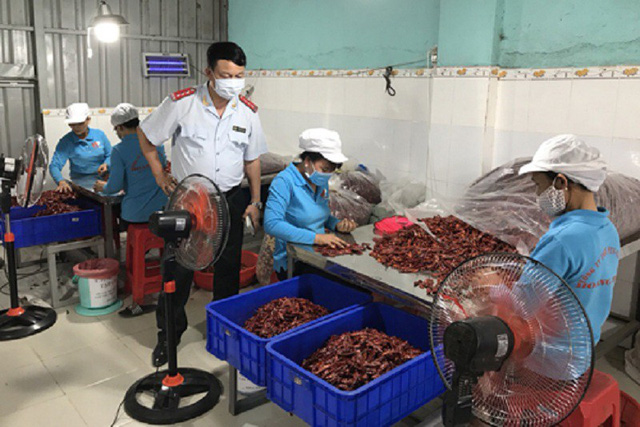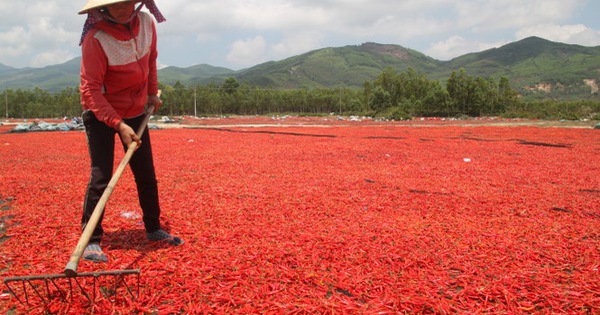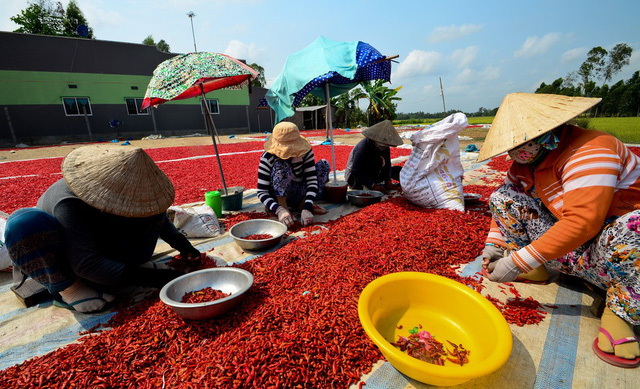Vietnam’s authorities have imposed fines on five local establishments for producing and trading poor-quality chili powder, which have been found containing excessive amount of a carcinogen, or cancer-causing agent.
The five facilities have been collectively fined VND110 million (US$4,840) and had all their products confiscated and destroyed by the working teams from the Ministry of Agriculture and Rural Development, despite having certificates of food safety conditions.
Chili powder is dried, pulverized chili pepper that is used as a spice to add pungency or piquancy and flavor to dishes.
The punishment is the result of three rounds of inspections at many chili powder-making facilities in Hue, Da Nang, Quang Nam, Quang Ngai, Ho Chi Minh City, Dong Thap, Dong Nai, Ba Ria - Vung Tau and Binh Phuoc.
Officers collected 262 samples of chili powder and dried chili in these localities and found that 95 of them, or 36.25 percent, exceed the allowed residue level of aflatoxin, a carcinogen that can cause liver or colon cancer.
Among those contaminated products, more than 30 percent came from production and storage facilities, over 48 percent were made by households and traded in traditional markets, and those on sale in supermarkets accounted for more than 21 percent.
 |
| An inspector from the Ministry of Agriculture and Rural Development observes the production process at a chili powder-making establishment . Photo: Tuoi Tre |
Mainly due to improper storage
Chili powder on sale without packaging, label and quality information, but stored in large bags of several dozen kilograms each, are easy to find in wholesale markets in Ho Chi Minh City, including Binh Tay in District 6, and Thi Nghe and Ba Chieu in Binh Thanh District.
T., a chili powder wholesaler in Ba Chieu told Tuoi Tre (Youth) newspaper that the products are not packaged because most of the products are bought from small, family-run establishments.
Nguyen Nhu Tiep, director of the National Agro-Forestry Fisheries Quality Assurance Department (NAFIQAD), said chili powder could easily be infected with aflatoxin if improperly stored and preserved.
According to Tiep, before being pulverized into powder, fresh chili peppers are often smashed and dried manually without any pieces of equipment. The finished products are then packaged in cursory fashion and under inappropriate moisture.
"If processed this way, chili powder is often contaminated with aspergillus flavus and aspergillus parasiticus fungi, the two main causes of aflatoxin," Tiep said.
Not really worrying?
According to Le Hong Minh, manager of sales department at Binh Tay Market, traders would source chili powder from household producers, which are likely to ignore food safety standards.
Nguyen Van Tien, acting chief of inspectorate of the agriculture ministry, said there is aldready a complete legal framework to hold people accountable for producing or trading unhealthy food products.
For instance, the Ministry of Agriculture and Rural Development oversees the production, processing and wholesale businesses, whereas its industry and trade counterpart controls the retail markets and supermarkets, and the health ministry promulgate national technical regulations on food safety, he elaborated.
“The problem is that the food manufacturers, processors and traders just do not comply with the law,” Tien explain.
“This is worsened by the fact that the inspection, supervision and coordination of relevant agencies on food safety have not been properly and strictly implemented.”
 |
| A farmer dries chili under the sun on a field in Vietnam. Photo: Tuoi Tre |
But some experts believe that the chili powder quality, as exposed by the inspection, is not necessarily worrying.
Pham Khanh Phong Lan, head of Ho Chi Minh City's food safety management agency, said it is not unusual for aflatoxin to be found in agricultural products.
“What counts is whether its content exceeds the allowable levels or not,” she said.
“In addition, chili powder is often used at a small amount so the risk is not high.”
Despite this, Lan acknowledged that consumers should be wary about the information.
Sharing her view, Do Thi Ngoc Diep, director of the Ho Chi Minh City Nutrition Center, the harmful effects aflatoxin can cause to one consumer vary, depending on many factors, such as their body weight or the amount of intake.
Like us on Facebook or follow us on Twitter to get the latest news about Vietnam!

















































